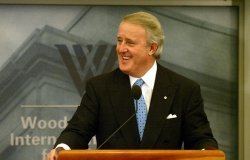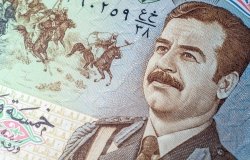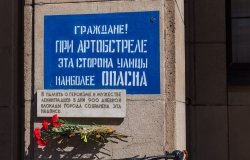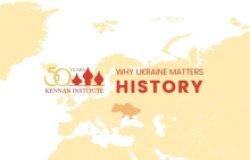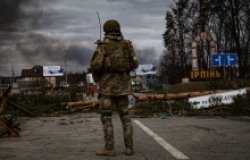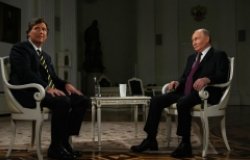Ignacy Paderewski and Woodrow Wilson: A Legacy of Freedom and Democracy
Bronislaw Geremek and H.E. Edward L. Rowny,President, INC International Negotiating Consultants, former U.S. Ambassador at Large and Lieutenant General, U.S. Army, and former Wilson Center Fellow
Overview
Bronislaw Geremek, former foreign minister of Poland and former Wilson Center fellow; H.E. Edward Rowny, president, INC International Negotiating Consultants, former U.S. ambassador-at-large and lieutenant general in the U.S. Army and former Wilson Center fellow.
This Director's Forum commemorated the cooperation between President Wilson and Paderewski, who was the Polish premier during World War I. In 1914, a mutual friend introduced Paderewski to Wilson and both worked to promote freedom and democracy. In fact, Paderewski drafted the 13th of Wilson's 14 Points, calling for a free and independent Poland. The two traveled to Paris together after the war to sign the Treaty of Versailles.
Before becoming a great statesman, Paderewski was a composer and concert pianist and remained devoted to music his entire life. In 1921, he left office to return to his music career. He continued to publicly speak on behalf of democracy. He also advocated music and the arts and contributed to programs to send Poles and Americans to study performing arts and international relations.
At the Forum, Edward Rowny commented how Paderewski gave money to scholars to become artists and to artists to become scholars. "What will help build ties between Poland and the United States is this great legacy of freedom and democracy, particularly through education and the arts."
President Franklin Roosevelt had ordered Paderewski's body to be buried in a crypt at Arlington National Cemetery to remain there until Poland was again independent. Ten years ago, Rowny had headed the honorary delegation that returned Paderewski's remains to Poland.
His Excellency Bronislaw Geremek said that Paderewski defended democracy and closer ties with Europe while denouncing Nazism and anti-Semitism. Paderewski had urged Poland to focus on orienting itself toward both the United States and Europe, and aggressively spoke out against totalitarian regimes, particularly in the 1920s and 1930s. He was a great statesman, all the while contributing to world culture through his music. "Paderewski was proud of Poland's contribution to world culture," Geremek said, and his legacy can serve to inspire the young Polish generation.
Sharon Coleman, director, Outreach & Communications, 202-691-4016
Drafted by Dana Steinberg
Hosted By

Global Europe Program
The Global Europe Program is focused on Europe’s capabilities, and how it engages on critical global issues. We investigate European approaches to critical global issues. We examine Europe’s relations with Russia and Eurasia, China and the Indo-Pacific, the Middle East and Africa. Our initiatives include “Ukraine in Europe” – an examination of what it will take to make Ukraine’s European future a reality. But we also examine the role of NATO, the European Union and the OSCE, Europe’s energy security, transatlantic trade disputes, and challenges to democracy. The Global Europe Program’s staff, scholars-in-residence, and Global Fellows participate in seminars, policy study groups, and international conferences to provide analytical recommendations to policy makers and the media. Read more
Thank you for your interest in this event. Please send any feedback or questions to our Events staff.



